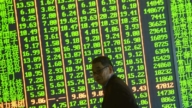【新唐人2013年10月22日讯】进入2013 年,中国经济走入低迷。制造业产能过剩、投资回报率低、地方债务加大、房地产泡沫日趋严重,放缓的经济引发外界关注。上周五,中共国家统计局发布前三季度中国GDP同比增长7.7%,其中三季度增长7.8%。不过,这组亮丽的数据受到多方质疑。数字背后真实的情况到底是怎么样?
10月18号,中共国家统计局公布的数字显示,今年前三季度中国经济增速为7.7%。其中第三季度经济增速为7.8%,相比第二季度的7.5%有较大幅度回升。
统计局于官网公布的数据还指出,今年前三季中国GDP总值达人民币38兆6千762亿元。
大陆经济学者马光远在新浪微博上表示,不能以GDP的数据来看待中国经济好坏。
《法兰克福汇报》、《世界报》对中国的官方数据也半信半疑:“北京公布的最新数据振奋了全球的金融市场,因为中国经济显得比许多国际观察员估计得要稳定。但是这些数字看起来太像被政府定好后通过统计局公布的。”
北京师范大学MBA导师、经济专栏作家段绍译认为,7.8%和7.5%是一回事,只要这个数据对中共有利,它就公布这个数字。
北京师范大学MBA导师段绍译:“我首先对它的数字的准确性我是不相信的,中国的统计数据本来就是它政治的需要、政府想写多少就写多少,相对于去年、前年来讲,它的经济增长速度确实降低了,到底降低到什么程度,谁也不知道。”
京华山一证券研究部主管彭伟新认为,第三季度的GDP数据受到质疑,是由于过去一段时间市场出现的钱荒。
京华山一证券研究部主管彭伟新:“也让外界方面对于内地银行方面出现坏账,出现一个非常大的增加,也是有这个预期”。
大陆金融分析师任中道表示,拉动经济增长的三驾马车投资、消费以及外贸,对GDP增幅做了贡献,而实际情况另有原因。
大陆金融分析师任中道:“它有相当一部分投资用到房地产,它不断的疯涨房价,地王出现的越来越多,外贸基本是负的、是负数,多个行业的产能过剩特别严重,钢铁、水泥等等,另一方面,它投资很多是去贷款、去发行、信托等,地方债也是不断的升高,由此可见,为什么质疑它,那就是它地方债和它投资的产能过剩有多么严重,这就是他背后的情况。”
据中共国家统计局官方公布的8月份70个大中城市房价数据变动情况显示,一线城市房价涨幅更多,城市新建商品住宅价格同比上涨在18%-20%之间,二线城市同比上涨大都在7%-10%之间。
不过,彭伟新表示,第三季度GDP较第二季度增长,是由于上半年铁道部改制成铁路总公司时,停止的与铁路相关的一些基建投资又从新开始加快。
京华山一证券研究部主管 彭伟新:“还有我们看到上半年制造业方面的情况是比较悲观的,但在下半年开始,在PMI的增长从新回复到50这个水平,明显看到内地制造业相关一些增长加快,也让GDP的增长在第三季度出现一个非常明显的增加。”
但彭伟新认为,整体楼价涨幅太快,以及人民银行对于一些贷款的增长限制,可能让GDP在第四季度的增长缓慢下来。
任中道则表示,由于当下中国的经济环境整体不行,许多企业觉得去做实业太难,于是把钱投到房地产业,投到影子银行,造成了这样的虚假繁荣。
大陆金融分析师任中道:“因此第一个质疑它这个数据,这个数据看着很亮,背后反映的是它的泡沫化,是更加的严重。”
任中道认为,只有通过经济学家、通过企业主的反馈,还有地方政府的操作行为,一起综合起来分析,才是中国经济实质的状况,而不是依靠中共国家统计局放出的这么一个数据。
采访编辑/易如 后制/钟元
China’s Q3 GDP Increase Had Hidden Economic Crisis
China’s economy slowed down in 2013, with manufacturing
overcapacity, low return on investment, local debt increase,
a worsening real estate bubble and economic slowdown.
On October 18, China’s National Bureau of Statistics
released China’s GDP for the first three quarters of the year
indicating an increase of 7.7%, with Q3 growth of 7.8%.
However, this good data received many questions.
What is the the real situation behind the numbers?
Figures published by Chinese Communist Party (CCP)’s
National Bureau of Statistics on October 18 indicates that
China’s economic growth in the first three quarters was 7.7%,
with 7.8% in Q3, a substantial recovery against Q2 at 7.5%.
The official website of the Bureau of Statistics also indicate
China’s GDP of the first three quarters of 2013 reached 38
trillion and 676.2 billion yuan.
Chinese economists Ma Guangyuan stated on Sina microblog,
the GDP data cannot be used to judge the Chinese economy.
Frankfurter Allgemeine Zeitung and Le Monde are also
dubious about CCP’s official data:
“The latest news from Beijing stimulates the global financial
market, as China’s economy seems to be more stable than
many international observers have estimated.
But these numbers seem too likely given by the government
and announced by the the Bureau of Statistics."
Beijing Normal University MBA tutor, economics columnist
Duan Shaoyi thinks 7.8% and 7.5% is very close.
As long as this data is beneficial to the CCP, it will publish.
Duan Shaoyi: “First I do not believe in the numbers.
China’s statistical data follows political needs.
It is whatever the government wants it to be.
China’s economic growth is indeed slower than last year
and the year before. But no one knows to what extent."
Peng Weixin, head of Securities Research Department at
Pang Core Pacific Yamaichi, thinks questions on Q3 GDP
data is due to money shortage around mid-year.
Peng Weixin: “It also caused the outside world expectation
that China’s banks will have a large increase in bad debts.”
China’s financial analysts Ren Zhongdao expressed that
the three key factors to push economic growth are:
Investment, consumption and foreign trade contributing
to the growth of GDP.
However, there are other reasons in reality.
Ren Zhongdao: “Quite a big portion of the investment
went to real estate. The housing prices keep increasing.
There are more and more real-estate tycoons.
Foreign trade is mainly negative, it is negative.
Many professions suffer from serious overcapacity, steel,
cement, etc.
On the other hand, investments went to loans, trust, etc.
Why do people question it?
The local debt issue and overcapacity issues are very serious."
According to the data released by National Bureau,
70 large and medium cities house price changes in August
indicate first-tier cities’ housing prices rose more.
New residential house prices rose between 18% -20%,
and mostly second-tier cities rose between 7% -10 % .
However, Peng Weixin said Q3’s growth vs Q2 is caused by
H1’s conversion of Ministry of Railways Railway into the
General Railway Co.
All rail-related infrastructure investment that was halted then
started up again at an accelerated pace.
Peng Weixin: “The situation of the manufacturing sector
was pessimistic in H1.
But in H2, the PMI growth went up back to 50.It is obvious
that was significant growth in manufacturing related fields.
This contributes to the significant GDP growth in Q3."
But Peng Weixin thinks that the overall real estate prices
rose too fast.
The People’s Bank’s limitations of certain loan growth
might slow down the growth of GDP in Q4.
Ren Zhongdao stated that the overall economic environment
in China today is not good.
Many companies feel it is too difficult to do actual production,
so they put money into real estate, invested in shadow banking.
This caused a false prosperity.
Ren Zhongdao: “So firstly is the question around this data.
The data looked bright, but it reflects the bubble behind it."
Ren Zhongdao thinks only through a consolidated analysis
by economists, including feedback from business owners and
taking into consideration operations of local governments,
can there be a real reflection of China’s economy.
Its not posisble to rely on the CCP National Bureau of
Statistics’ data.
NTD Reporter Yi Ru




























